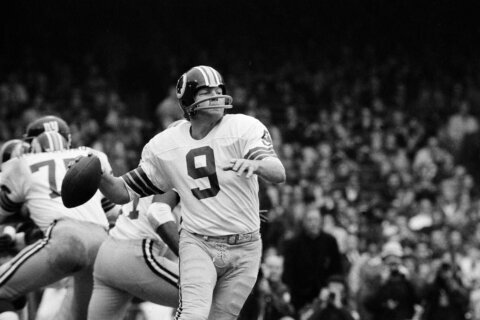Why Russell Wilson chose Denver over Washington originally appeared on NBC Sports Washington
Just one week ago, Commanders head coach Ron Rivera made a statement that left little doubt about Washington’s desperation to improve at quarterback this offseason.
“Does anybody really care what was traded for Matthew Stafford last year? No.” Rivera asked, in reference to the Rams’ blockbuster, one that led to a Super Bowl title just one year later.
Now, just one week after making that statement, Rivera and the Commanders have finished runner-up once again. Seattle has reportedly agreed to trade star quarterback Russell Wilson to the Denver Broncos in exchange for QB Drew Lock, TE Noah Fant, DL Shelby Harris, two future firsts, two future seconds and a fifth-rounder. The Broncos also received a fourth-rounder in return.
Denver now has its franchise quarterback. Washington, meanwhile, remains on that quest.
Shortly after news broke that Wilson is headed to the Mile High City, NFL Network insider Ian Rapoport made it clear that the Broncos were Wilson’s top choice. Washington inquired about Wilson, too, according to multiple reports. The Burgundy and Gold made a substantial offer for the nine-time Pro Bowler but were turned down last week.
On the surface, both Denver and Washington had similar rosters before the trade. Each team has plenty of young talent on both sides of the football. And, entering the offseason, both clubs felt they were a quarterback away from truly contending.
That begs the question: Why would Wilson — a Virginia native, nonetheless — want to play for Denver in the loaded AFC West over his hometown Washington team, a squad in a much easier conference?
Unfortunately for the Commanders, it’s not that simple. And for Rivera, it’s clear his pitch isn’t working.
To start, this deal happened because Wilson, who has a no-trade clause in his contract, truly wanted to be in Denver.
“He wanted to go to Denver,” Rapoport said. “This was his preferred destination, in part because of the young roster, the receivers, a pretty baller defense and a coach in Nathaniel Hackett that had so much success with Aaron Rodgers.”
For Wilson, it’s evident that playing in the same division as Patrick Mahomes and Justin Herbert was not a dealbreaker on his preferred landing spot. The quarterback is clearly confident in Denver’s current roster and coaching staff enough to win right now, regardless of the talent the rest of the AFC West has.
Playing in a stacked division is nothing new for Wilson. When he entered the NFL in 2012, San Francisco was an annual Super Bowl contender and one of the best teams in the league. Arizona nearly made the Super Bowl in 2015. And over the past three years, both the Rams and 49ers have each made the Super Bowl, with Los Angeles winning it this past year.
Yet, despite playing in an uber-talented NFC West for much of his career, Wilson led the Seahawks to nine straight winning seasons and two Super Bowl appearances. The 33-year-old certainly isn’t scared to face Mahomes and Herbert twice per year. In fact, he probably embraces the opportunity.
From Seattle’s standpoint, trading Wilson to the Broncos makes a lot more sense than shipping him to Washington. Denver is in the AFC, so Seattle only will have to face him once every four years. Wilson being in Denver barely impacts Seattle’s quest to rebuild into a contender once again.
Had the Seahawks sent Wilson to Washington, they’d have to face the quarterback at least once every three years at the minimum. That doesn’t include potential playoff meetings or other scheduled regular-season matchups depending on divisional placing, either.
Washington made an offer that included three high-round picks over the next three NFL Drafts, according to SI’s Albert Breer. The Commanders were told no in part because Seattle didn’t want to trade Wilson within the NFC.
It’s easy for Washington fans to look at the offer Seattle accepted and think, ‘Wow, the Commanders couldn’t have topped that?’ In reality, it’s quite possible Washington offered Seattle a more lucrative package, especially when it comes to the players in return. Based on Rivera and Mayhew’s recent comments, no player outside of Terry McLaurin (and maybe Chase Young) was untouchable.
But if Seattle was hellbent on trading Wilson out of the NFC, which appears to be the case, then the Commanders never truly stood a chance.
It’s also worth noting that the NFC is extremely top-heavy at quarterback, while the AFC is littered with young talent. Outside of Aaron Rodgers and Stafford, who’s the next best QB in the NFC? Kyler Murray? Kirk Cousins? Matt Ryan? None of those names exactly move the needle.
The simple truth is that if Seattle hits on a quarterback in the draft, whether that be this year or next, the Seahawks’ rebuild process will accelerate rather quickly. And, Wilson being in the AFC is now one less elite talent Seattle has to worry about within the conference.
With Rodgers staying in Green Bay and Wilson headed to Denver, Washington’s two top options –whether realistic or not — are off the table. Outside of Deshaun Watson, whose legal situation makes it extremely tricky to make a trade for, there aren’t any true franchise quarterbacks still available.
For a second straight season, Washington finished as the runner-up in a league-altering quarterback trade. They don’t deserve a silver medal for their effort, though. Just because the franchise tried to land an elite quarterback does not mean anything. At some point, the organization actually has to do it.






